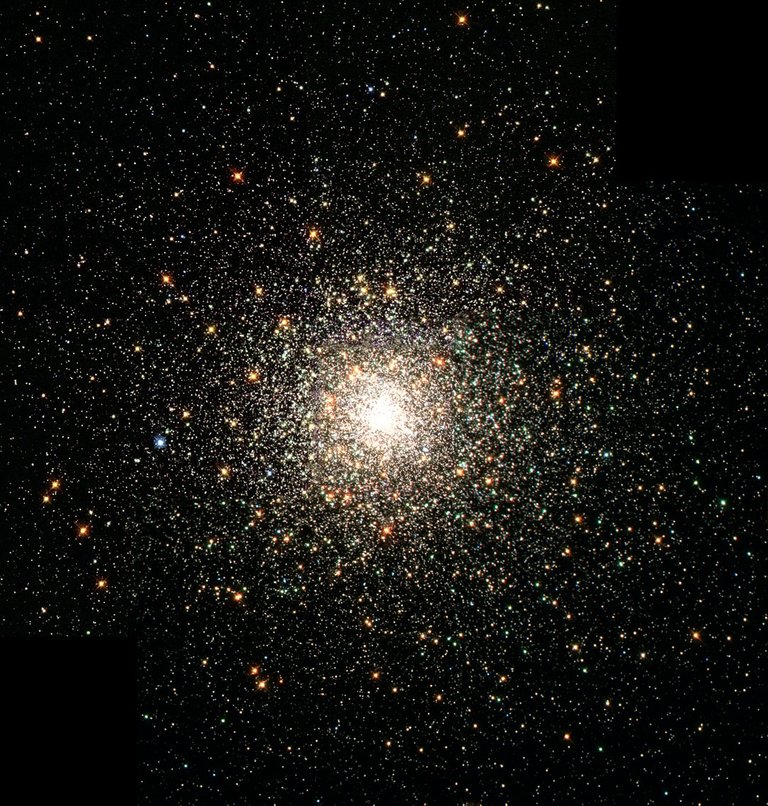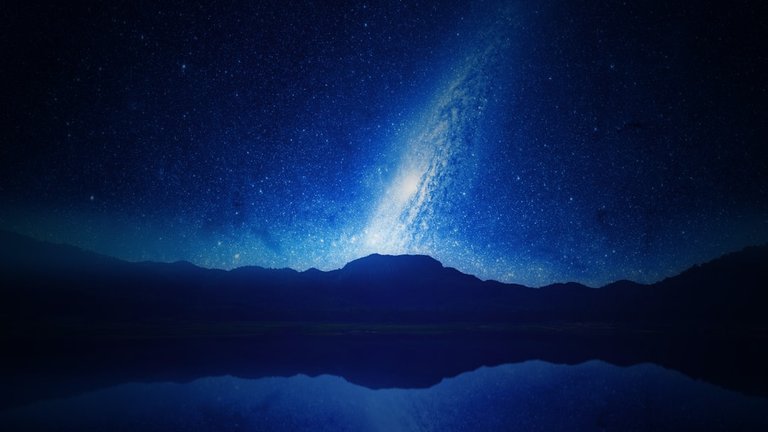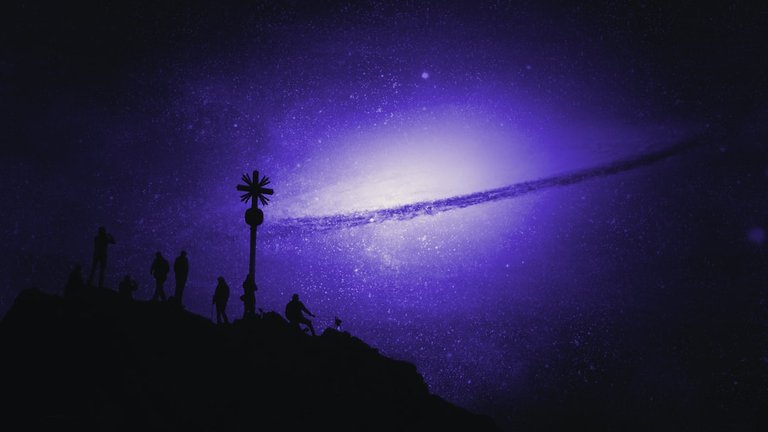"Our little Spaceship Earth is only eight thousand miles in diameter, which is almost a negligible dimension in the great vastness of space."
- R. Buckminster Fuller -
Did the size of the universe really change?
I've been planning to write about this since late last year, when I first read the news. Recent research has revealed our universe to be much larger than previously thought.
Until last fall, cosmologists believed the universe to contain somewhere between one and two hundred billion galaxies. Researchers now believe it holds closer to two trillion galaxies, approximately ten times as many as previously thought to exist.
Our corner of the universe...
Image courtesy of Sweet Ice Cream Photography and http://unsplash.com
Last October,
astronomers at the University of Nottingham, School of Physics & Astronomy, published this paper presenting their findings:
In the paper, they report:
"...we further show that the total number of galaxies in the universe ... is ... (two trillion), almost a factor of ten higher than would be seen in an all sky survey at Hubble Ultra-Deep Field depth."
You can read more about it in the Atlantic article I originally read.
I suspect that because the universe is so incomprehensibly large,
unimaginably beyond our ability to grasp, the news sort of "fell into a crack."
It's disturbing news, simply because it hurts our brains. It confronts us with our smallness.
It was in fact a little bit difficult to find the original articles and references that I recalled from last fall. There is a certain amount of cognitive dissonance that accompanies being confronted with news like this.
200 billion was not enough.
Image courtesy of Juskteez Vu and http://unsplash.com
Hey, wasn't 200 billion galaxies enough?
I guess not. Mankind's irrepressible search for knowledge has driven us to look farther and count more carefully than ever before. And this is probably not be the end of the road. There are new and far more powerful space telescopes on the way.
Will more galaxies be found?
Image courtesy of Juskteez Vu and http://unsplash.com

A beautiful globular star cluster.
Image courtesy of NASA and http://unsplash.com
I have a personal stake in this news.
As someone who believes that Jesus is God, I also believe that he has promised me eternal life.
As in, life that never ends. No death. Eternity.
I've previously written about eternity being a very long time. When some people contemplate the concept of eternity in the New Heavens and New Earth, they mistakenly conclude that living forever could be boring.
Seriously? Boring?
While galaxies come in many shapes and sizes, on average they may hold four billion planets in "the goldilocks zone." That is the distance from their star in which liquid water can exist.

Try reading John's book.
Image courtesy of Ben White and http://unsplash.com
In other words,
multiply four billion worlds by two trillion galaxies, and that's the number of potentially habitable planets I may be able to visit and explore during an endless life. And, that's just the ones we know about so far.
No, I don't think I'll be getting bored any time soon...
As I often do,
I invite you to read John's book, learn about, and perhaps come to believe in Jesus, the creator of all things. Won't you join me on this magnificent adventure?
Visit my Library Science Shelf for more science articles.

~FIN~
LOOK! Check out our amazing product:>>CLICK HERE!<<
You are why I'm here on Steemit!
I have very eclectic interests and hope, over time, to write about them all.
CLICK Each Image Below⬇️⬇️To Check Out @creatr's World⬇️

|

|

|



Interesting post!
I think you might be misunderstanding the usage of the term universe in the papers you are talking about. When we are making estimations about the number of galaxies, the number of particles (a fascinating and mind-boggling calculation) or anything about the size of our universe, we are not talking about the whole universe that exists. In that cases we are referring to the observable universe. We actually don't know if the whole universe that expands beyond the edge of what we can observe is finite or infinite. An extrapolation of what we see in the observable universe seems to suggest that it is indeed infinite, so the number of worlds in habitable zones must then be an infinite number too.
What seems to limits how much of the universe we can observe is the fact that the universe is not ageless. It seems to have started to exists at some point, so there is a limit to the age of the light that can reach us. Since light travels at a constant speed, this limits the furthest regions of the universe that we can see since light that started from places that are too far hasn't had the time to reach us yet. So in that sense, not only is space-time expanding, but so is the observable universe as with every second that passes from the beginning of the universe, more and more light will have had enough time to reach us so we can observe it.
So the observable universe is not really talking about the whole universe that exists, but the arguably arbitrary portion of the universe that is possible for us to see and somehow measure.
Hello, Dave. I do quite well understand that the estimates are the "observable universe." I realize that our knowledge is quite limited, and in fact that what we "know" about our universe is often largely speculative and based on the hypotheses we develop based on what we can observe.
Many of those hypotheses are driven by philosophical presupposition. I've written about this before, and mentioned one of the theoreticians whose presuppositions are similar to mine, Dr. Russel Humphries. Have you read any of his thoughts about the evidence for a shell-like arrangement of galaxies based on red-shift data?
Thanks for your comments.
Sure. I guess I didn't word the preface to my comment very well as I thought the "might" in there would be enough to convey that I'm not sure about how you used the term and my guess was noting more than a hunch. It was probably better to ask or to not mention it, instead of sharing that hunch at all as it adds no value to the discussion. I'm quite unhappy now when I reread my comment since it does sound condescending, so I'd like to apologize for that. I'm not really sure what I was really thinking there, seems I was on a bit of a bad roll yesterday :/
The reason I mentioned the observable universe is that the property you were referring to in your post doesn't really have bearing on an infinite universe. Even if the universe has 10 times the density compared to what we previously though, it would still be infinite. I guess, I would have been much better off just sharing this though without the rest of the ramblings...
I don't think that's the case. Can you point me to such presuppositions? I can see Dr. Humphries making presuppositions (like the Earth is 6000 years old) and trying to make the data fit that explanation. I have to say there is quite a lot of evidence that he is indeed patently wrong as his theories are widely inconsistent with all kinds of data that we have. The piles of evidence that the Earth's age is in the billions of years are really overwhelming and I would find it quite surprising if you wanted to argue young Earth creationism.
Real scientists do not presuppose, they come up with a hypothesis and test it (try to falsify it with empirical data). The idea for the Big Bang was not an idea somebody had which they tried to justify with data. It's an idea that came about after somebody came up with an astounding result that was independently verified, continues to be reliable and repeatable and that actually turned our ideas about the universe on their head. You have to ask yourself why red-shift quantization hasn't done the same so far. My explanation is that it hasn't managed to actually present any significant results.
I'd like to point you to the most recent study about that with the largest sample size I've found [link]. Keeping in mind the mind-boggling number of galaxies we can observe (the Hubble telescope found thousands of those in its first hour of operation looking at a single patch of dark sky), this study decided on a sample of 250. The last sentence of their abstract is "The formal confidence levels associated with these results are extremely high." Keeping in mind the sample size and the actual amount of data we have access to, this claim is patently ridiculous. The other study I found was looking at 78 galaxies...
Keep in mind that crunching the numbers for a much larger sample size would not be a difficult task with modern computing power. If those "scientist" really cared about real inquiry into truth, they would have already crunched the data for at least a decent sample sizes and if they were correct in their hypothesis, they would have already collected their Nobel Prizes after justifying their claims properly. So far all of this looks like simple cherry-picking.
It's hard to really grasp how big the universe is. When all you can see is the small world surrounding you and a small piece of the sky it is hard to imagine so much more exists outside of your little world.
Yes, I find it to be a rather strenuous mental exercise. Nonetheless, it is intriguing and draws me in like a moth to a flame! :D
It does make one wonder if the universe is continually expanding, what is it expanding into. What was there before there was a there lol.
Forever does sound intriguing. I might even be able to learn to play guitar, maybe. Unless there is a change, it seems that many academics see the future of the universe to be less than "bright". Between a Big Crunch or a Big Freeze, it may be dark and chilly.
My grandpa used to say, "If the universe isn't infinite, wouldn't there be a wall at the end? What's on the other side of the wall?"
A Big Freeze? That would be true indeed, if entropy maintains its stranglehold on matter.
My personal opinion? It's based on my theology.
I believe that when Adam fell from grace, God pronounced a curse on the universe. Entropy as we know it is a significant component of that curse. I believe that when Jesus/God returns as he has promised, that curse will be lifted and there will no longer be an expectation of the "heat death" of the universe as presently envisioned.
That's my "long view," based as I've said on my theological outlook.
While it seems like a lifetime ago that I began to learn to play the guitar, I am still very far from mastering it. I tend to be a "dabbler," probably because I'm interested in everything, and can't stay focused long enough to master much of anything... :D I do want to learn more musical instruments, however! I've got big plans for eternity, that's for sure. ;)
Thanks for visiting and for your insightful comments.
The possibilities are endless! Makes me wonder what else is out there.
I recall lying in bed one night when I was seventeen and contemplating eternity. It made me shake uncontrollably. I felt as if I had been pulled into an infinite vortex. I have never terrified myself again with thoughts of eternity or infinity. Outer space is an alien place and and I am comforted by familiar things much closer to home :)
So, one of my friends and I have agreed to open "The NoFed Inn" on one of the planets orbiting in this Five-Star Solar System when the Kingdom comes.
Does this mean you'll decline my invitation to spend a holiday vacationing with us at our literally five-star establishment? ;) I promise, we'll treat you well! ;)
go ahead, bend my arm, why don't you? LOL!!
Nice GIF, thanks. ;)
It shows the vast magnitude of our God. Endless galaxies and universes. Other people and other earths in other galaxies. WOW! Did I say our God is an awesome God? It shows how great his is. Yes a Star Trek moment except this one is spiritual and glorious and not a fight with the Klingons. Heavenly bodies visiting planets...the possibilities stretch to eternity. Thanks for your friendship Creatr and thanks for sharing. - Troy
Yep, very exciting to contemplate! Thanks for commenting. :D
Just finished commenting on your government article, and then I saw this gem in my feed. Two creatr creations in one fortnight, I like it!
And oh how small we are, haha. Sometimes I wonder if God is saying, "and you think that is a lot, watch this." It makes me sit under the stars and marvel that He chose to show me grace. Thanks for the reminder! :)
I constantly struggle to try to begin to grasp the magnitude... Mind boggling!
Thanks for visiting. ;)
Of course. ;)
Its a huge number. What unknown strangeness must be out there that we cant even imagine!
Yes! The thought of exploring any of it thrills me! :D
Anything is possible, theoretically anyway ;)
Some believe the universe could be literally boundless. So difficult to imagine.
"Everything is a UFO until it's not!" Steem the Dream!
some believe that we are part of the universe and that the universe is inside of us too!Truly amazing my friend @creatr
I believe that our bodies are made from the dust of the earth! :D
And so, I guess we are both part of the universe and part of it is inside us... ;)
The size of the universe staggers my imagination...
Thanks for your visit! :D
:)
Très bon article. Cette article m'intéresse beaucoup. Merci